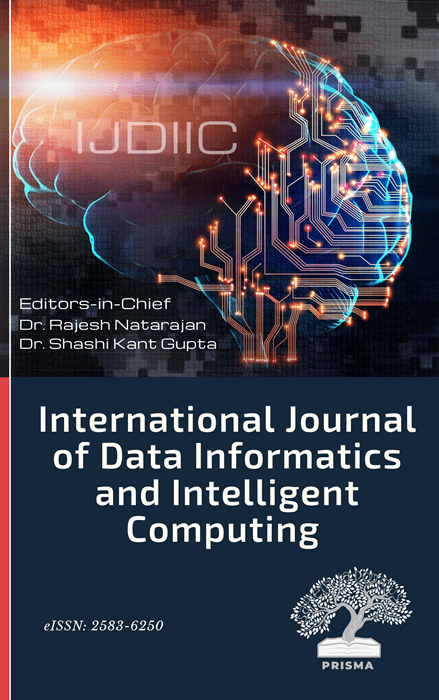Techniques to improve 5G blockchain scalability issues through an analysis of a blockchain scalability
DOI:
https://doi.org/10.59461/ijdiic.v3i4.134Keywords:
Blockchain, Scalability, Bitcoin, Cryptocurrency, 5G Energy EfficiencyAbstract
As 5G networks advance, integrating blockchain technology to enhance security and decentralization shows great potential but faces significant scalability challenges. This study focuses on addressing these scalability issues in 5G blockchain networks by analyzing key factors such as transaction throughput, consensus mechanisms, and network latency. We propose several models to improve scalability, including sharding, sidechains, optimized consensus algorithms, and off-chain solutions. These models were evaluated through simulations using real-time data, with accuracy levels of up to 95% in predicting performance improvements across various metrics. The paper investigates the challenges specific to 5G environments, such as high transaction volumes and diverse device requirements, and assesses the strengths and limitations of each scalability technique in this context. Our findings highlighted potential synergies between these solutions and the unique features of 5G network architecture, offering tailored strategies for enhancing blockchain scalability. Additionally, the study addresses energy efficiency concerns associated with blockchain technologies and suggests optimization strategies. Simulated results are compared with real-world data, achieving accuracy rates of over 90% in identifying bottlenecks and validating the effectiveness of the proposed solutions. The insights presented aim to optimize 5G blockchain performance in dynamic, resource-constrained environments, facilitating the adoption of secure and decentralized applications in next-generation networks.
Downloads
References
M. Tahir, M. H. Habaebi, M. Dabbagh, A. Mughees, A. Ahad, and K. I. Ahmed, “A Review on Application of Blockchain in 5G and Beyond Networks: Taxonomy, Field-Trials, Challenges and Opportunities,” IEEE Access, vol. 8, pp. 115876–115904, 2020, doi: 10.1109/ACCESS.2020.3003020.
A. Dhar Dwivedi, R. Singh, K. Kaushik, R. Rao Mukkamala, and W. S. Alnumay, “Blockchain and artificial intelligence for 5G‐enabled Internet of Things: Challenges, opportunities, and solutions,” Trans. Emerg. Telecommun. Technol., vol. 35, no. 4, Apr. 2024, doi: 10.1002/ett.4329.
A. Chaer, K. Salah, C. Lima, P. P. Ray, and T. Sheltami, “Blockchain for 5G: Opportunities and Challenges,” in 2019 IEEE Globecom Workshops (GC Wkshps), IEEE, Dec. 2019, pp. 1–6. doi: 10.1109/GCWkshps45667.2019.9024627.
D. C. Nguyen, P. N. Pathirana, M. Ding, and A. Seneviratne, “Blockchain for 5G and beyond networks: A state of the art survey,” J. Netw. Comput. Appl., vol. 166, p. 102693, Sep. 2020, doi: 10.1016/j.jnca.2020.102693.
S. P. Sankar, T. D. Subash, N. Vishwanath, and D. E. Geroge, “Security improvement in block chain technique enabled peer to peer network for beyond 5G and internet of things,” Peer-to-Peer Netw. Appl., vol. 14, no. 1, pp. 392–402, Jan. 2021, doi: 10.1007/s12083-020-00971-w.
A. Singh, R. M. Parizi, M. Han, A. Dehghantanha, H. Karimipour, and K.-K. R. Choo, “Public Blockchains Scalability: An Examination of Sharding and Segregated Witness,” 2020, pp. 203–232. doi: 10.1007/978-3-030-38181-3_11.
I. Mistry, S. Tanwar, S. Tyagi, and N. Kumar, “Blockchain for 5G-enabled IoT for industrial automation: A systematic review, solutions, and challenges,” Mech. Syst. Signal Process., vol. 135, p. 106382, Jan. 2020, doi: 10.1016/j.ymssp.2019.106382.
N. Balani, P. Chavan, and M. Ghonghe, “Design of high-speed blockchain-based sidechaining peer to peer communication protocol over 5G networks,” Multimed. Tools Appl., vol. 81, no. 25, pp. 36699–36713, Oct. 2022, doi: 10.1007/s11042-021-11604-6.
J. Xie, F. R. Yu, T. Huang, R. Xie, J. Liu, and Y. Liu, “A Survey on the Scalability of Blockchain Systems,” IEEE Netw., vol. 33, no. 5, pp. 166–173, Sep. 2019, doi: 10.1109/MNET.001.1800290.
P. Gorla, V. Chamola, V. Hassija, and N. Ansari, “Blockchain Based Framework for Modeling and Evaluating 5G Spectrum Sharing,” IEEE Netw., vol. 35, no. 2, pp. 229–235, Mar. 2021, doi: 10.1109/MNET.011.2000469.
M. H. Nasir, J. Arshad, M. M. Khan, M. Fatima, K. Salah, and R. Jayaraman, “Scalable blockchains — A systematic review,” Futur. Gener. Comput. Syst., vol. 126, pp. 136–162, Jan. 2022, doi: 10.1016/j.future.2021.07.035.
S. K. Singh, S. Rathore, and J. H. Park, “BlockIoTIntelligence: A Blockchain-enabled Intelligent IoT Architecture with Artificial Intelligence,” Futur. Gener. Comput. Syst., vol. 110, pp. 721–743, Sep. 2020, doi: 10.1016/j.future.2019.09.002.
K. E. Skouby and P. Lynggaard, “Smart home and smart city solutions enabled by 5G, IoT, AAI and CoT services,” in 2014 International Conference on Contemporary Computing and Informatics (IC3I), IEEE, Nov. 2014, pp. 874–878. doi: 10.1109/IC3I.2014.7019822.
D. Berdik, S. Otoum, N. Schmidt, D. Porter, and Y. Jararweh, “A Survey on Blockchain for Information Systems Management and Security,” Inf. Process. Manag., vol. 58, no. 1, p. 102397, Jan. 2021, doi: 10.1016/j.ipm.2020.102397.
S. Shanmugam, R. Natarajan, G. H. L., F. Flammini, B. Sulaiman Alfurhood, and A. Premkumar, “Blockchain‐Based Piecewise Regressive Kupyna Cryptography for Secure Cloud Services,” IET Inf. Secur., vol. 2024, no. 1, Jan. 2024, doi: 10.1049/2024/6863755.
S. Wang, X. Zhu, and S. Zhao, “Blockchain-Based SDN Security Guarantee Model,” in 2019 IEEE 19th International Conference on Communication Technology (ICCT), IEEE, Oct. 2019, pp. 1296–1300. doi: 10.1109/ICCT46805.2019.8947081.
S. Onopa and Z. Kotulski, “State-of-the-Art and New Challenges in 5G Networks with Blockchain Technology,” Electronics, vol. 13, no. 5, p. 974, Mar. 2024, doi: 10.3390/electronics13050974.
X. Li, P. Jiang, T. Chen, X. Luo, and Q. Wen, “A survey on the security of blockchain systems,” Futur. Gener. Comput. Syst., vol. 107, pp. 841–853, Jun. 2020, doi: 10.1016/j.future.2017.08.020.
R. R. Chandan, A. Balobaid, N. L. S. Cherukupalli, G. H L, F. Flammini, and R. Natarajan, “Secure Modern Wireless Communication Network Based on Blockchain Technology,” Electronics, vol. 12, no. 5, p. 1095, Feb. 2023, doi: 10.3390/electronics12051095.
A. Alkhamisi, I. Katib, and S. M. Buhari, “Blockchain-Based Control Plane Attack Detection Mechanisms for Multi-Controller Software-Defined Networks,” Electronics, vol. 13, no. 12, p. 2279, Jun. 2024, doi: 10.3390/electronics13122279.
Downloads
Published
How to Cite
Issue
Section
License
Copyright (c) 2024 Umar Danjuma Maiwada, Muhammad Muntassir Yakubu, Abubakar Danjuma Maiwada, Jameel Shehu Yalli, Izaddeen Kabir Yakasai

This work is licensed under a Creative Commons Attribution-ShareAlike 4.0 International License.








